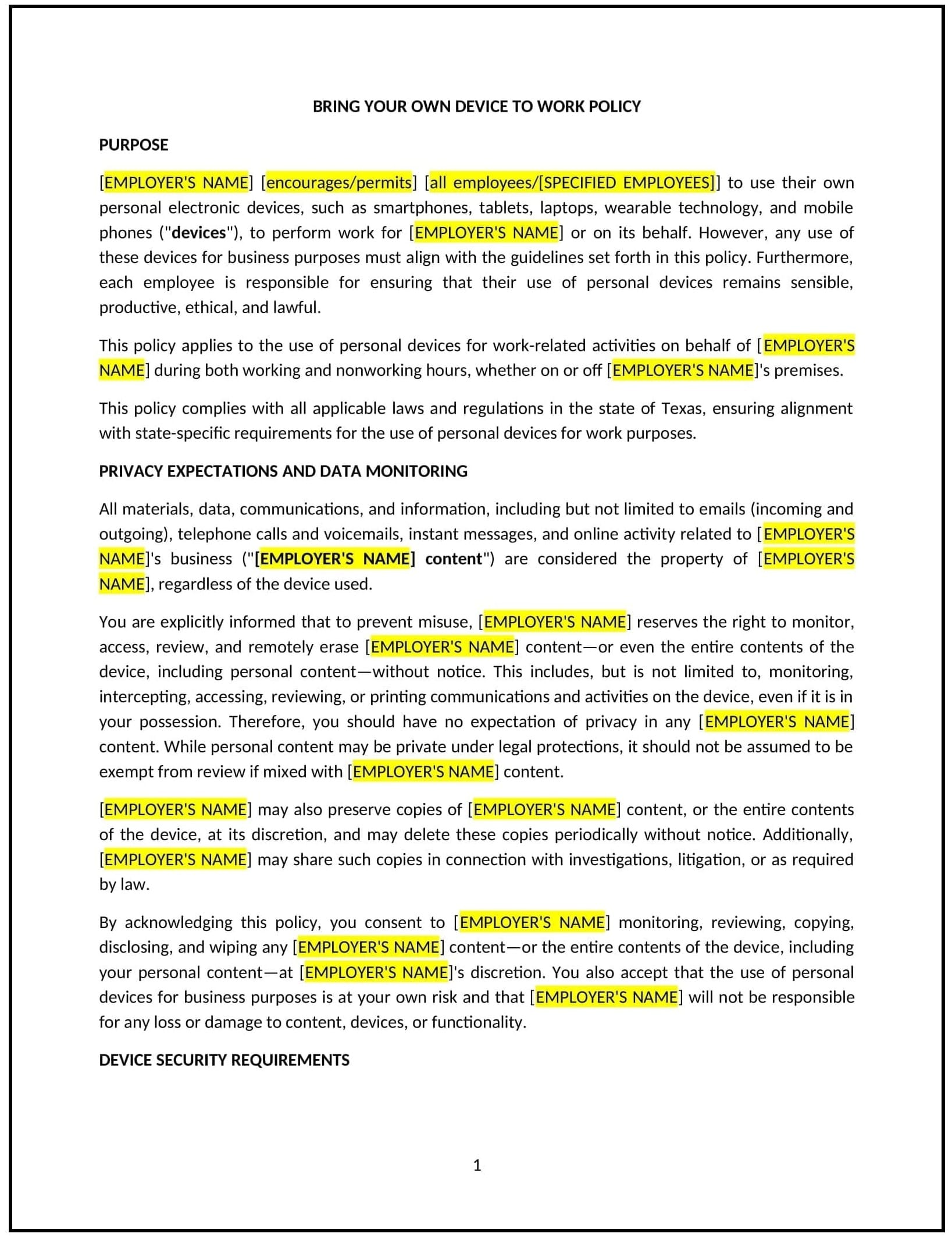Bring your own device (BYOD) policy (Texas): Free template
Got contracts to review? While you're here for policies, let Cobrief make contract review effortless—start your free review now.

Customize this template for free
Bring your own device policy (Texas)
This bring your own device (BYOD) policy is designed to help Texas businesses manage the use of personal devices (such as smartphones, laptops, and tablets) for work purposes. Whether businesses are supporting flexible work arrangements or enhancing productivity with personal devices, this template provides a structured approach to managing security, access, and data protection in the workplace.
By adopting this template, businesses can benefit from the flexibility of BYOD while ensuring that company data remains secure and employees comply with company guidelines.
How to use this bring your own device (BYOD) policy (Texas)
- Define allowed devices: Specify which devices are permitted for use under the BYOD policy, including mobile phones, tablets, laptops, and other personal technology that may be used for work.
- Set security requirements: Outline the security protocols that must be followed when using personal devices, such as password protection, encryption, anti-virus software, and remote wipe capabilities.
- Establish data access guidelines: Clearly define which company data can be accessed on personal devices and ensure that employees are aware of the limitations and responsibilities associated with accessing sensitive information.
- Set usage restrictions: Outline acceptable use of personal devices, including restrictions on downloading unapproved apps, accessing certain websites, or using devices for personal activities during work hours.
- Address support and troubleshooting: Specify whether the company will provide technical support for personal devices and to what extent, including guidelines for troubleshooting and software updates.
- Outline consequences for policy violations: Define the actions that will be taken if employees fail to adhere to the BYOD policy, such as restrictions on device access or disciplinary measures.
Benefits of using this bring your own device (BYOD) policy (Texas)
This policy offers several benefits for Texas businesses:
- Increases productivity: Allowing employees to use their personal devices for work can lead to greater convenience and flexibility, ultimately increasing productivity and efficiency.
- Reduces hardware costs: BYOD helps businesses reduce the costs of providing devices, as employees use their own personal equipment for work-related tasks.
- Supports a flexible work environment: BYOD policies are ideal for businesses that support remote work, flexible hours, or employees who travel frequently, enabling them to stay connected and productive.
- Improves employee satisfaction: Employees may prefer using their personal devices, which are typically more familiar and comfortable to use, leading to higher satisfaction and engagement.
- Ensures data security: By setting clear security protocols and access controls, businesses can protect company data and minimize risks associated with personal device usage.
Tips for using this bring your own device (BYOD) policy (Texas)
- Communicate clearly: Ensure all employees understand the BYOD policy, including the security protocols, acceptable use guidelines, and their responsibilities regarding personal devices.
- Provide training: Offer training to employees on best practices for securing their personal devices and protecting company data, including the use of strong passwords and securing apps.
- Monitor compliance: Regularly monitor employee adherence to the BYOD policy, ensuring that devices are properly secured and that employees follow guidelines regarding data access and device usage.
- Offer support as needed: Clarify the extent to which the company will support employees in troubleshooting or updating personal devices and provide resources for any issues that arise.
- Review regularly: Update the BYOD policy periodically to reflect changes in technology, security best practices, or Texas state laws related to data protection and employee privacy.